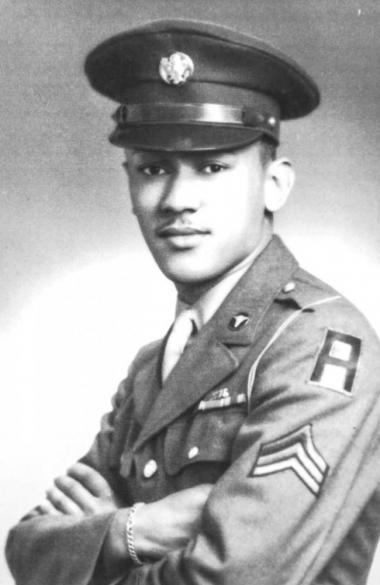
Corporal Waverly Bernard "Woody" Woodson, Jr. (1922–2005), a medic in the U.S. Army during World War II, treated maimed soldiers for 30 hours straight on D-Day (June 6, 1944), despite having received shrapnel wounds when the transport boat that brought him ashore on Omaha Beach had been blasted by German gunfire. He set up his medic station, where he bandaged wounds, gave injections, removed bullets, performed an amputation—all after dragging each maimed solder from the killing zone. He had been a pre-med student at Lincoln University when the war started, so he left college, enlisted in the Army, and completed Officer Candidate School in Ant-Aircraft Artillery (AAA). As was typical in that era, the Army had no positions for black officers in AAA and so steered him into medic training and ultimately assigned him to the racially segregated 320th Barrage Balloon Battallion, a black unit that positioned balloons in battle areas to thwart enemy aircraft assaults and the only black unit to storm Omaha Beach on D-Day. His actions on D-Day did not go unnoticed: the Pittsburgh Courier wrote that he was the "No. 1 Invasion Hero" and the Stars and Stripes (the official U.S. military publication) described him as one of the medics who "covered themselves in glory on D-Day." The media attention, along with the support of white officers such as General John H.C. Lee, was not enough to overcome the racially segregated attitudes of the Army at that time, so Waverly did not receive the highest honor of valor, the Medal of Honor. He received, instead, the Bronze Star (fourth highest honor) and a Purple Heart. After the war, he returned to Lincoln University, graduating in 1948, and also earned a medical technology degree with honors from Franklin Institute in Philadelphia, Pennsylvania, his hometown, before returning to active military duty during the Korean War. After that war he began a long and increasingly successful career at Walter Reed Medical Center in Bethesda, Maryland, working as director of the morgue and teaching anatomy classes. He retired as supervisor from the National Institutes of Health Clinical Pathology Department in 1990 (some sources say 1980). The Clarksburg, Maryland resident died in 2005 and was buried in Arlington National Cemetery. Waverly's family, Senator Chris Van Hollen (D-MD), and author Linda Hervieux, have advocated for the awarding of a posthumous Medal of Honor for this D-Day hero.

